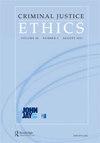Criminal Culpability and the Political Meaning of Age
Q2 Social Sciences
引用次数: 0
Abstract
In The Age of Culpability, Gideon Yaffe argues that all minors who commit crimes should be treated more leniently by the criminal law than similarly situated adults. All “kids” deserve a break, he contends, because they are less culpable as a class than adults. They are less culpable because they less of a “say” over the content of the law, and they have less of a “say” because they are denied the right to vote. Yaffe attacks the belief that kids should get a break because they are psychologically different from adults in relevant ways, arguing that difference-based rationales for giving kids a break do not go far enough in justifying the result he seeks – lenient treatment by the criminal law for all kids, all the time. Yaffe proposes to replace the Difference Hypothesis with the affirmative argument that all kids deserve a break because all kids are denied the right to vote. This review essay raises questions about both Yaffe’s negative argument against what I call the “Difference Hypothesis”, and his affirmative argument that kids deserve leniency for their crimes because they lack voting rights. The review suggests that for purposes of deciding criminal policy, Yaffe’s affirmative proposal suffers from a number of potential weaknesses that call for further explanation, while the Difference Hypothesis has demonstrated a number of important strengths which Yaffe fails to consider.刑事罪责与年龄的政治意义
Gideon Yaffe在《有罪时代》一书中认为,所有犯罪的未成年人都应该受到刑法的宽大处理,而不是处境相似的成年人。他认为,所有的“孩子”都应该休息一下,因为他们作为一个阶层比成年人更不应受谴责。他们的罪责较小,因为他们对法律内容没有“发言权”,也因为他们被剥夺了投票权,所以他们没有“发言”权。Yaffe抨击了这样一种观点,即孩子们应该休息一下,因为他们在心理上与成年人在相关方面不同,他认为,给孩子休息的基于差异的理由不足以证明他所寻求的结果是合理的——刑法一直对所有孩子都给予宽大处理。Yaffe建议用肯定的论点取代差异假说,即所有孩子都应该休息一下,因为所有孩子都被剥夺了投票权。这篇评论文章对Yaffe反对我所说的“差异假说”的否定论点和他认为孩子们因为缺乏投票权而应该得到宽大处理的肯定论点提出了质疑。审查表明,为了决定刑事政策,Yaffe的肯定性建议存在一些潜在的弱点,需要进一步解释,而差异假说证明了Yaffe没有考虑的一些重要优势。
本文章由计算机程序翻译,如有差异,请以英文原文为准。
求助全文
约1分钟内获得全文
求助全文

 求助内容:
求助内容: 应助结果提醒方式:
应助结果提醒方式:


